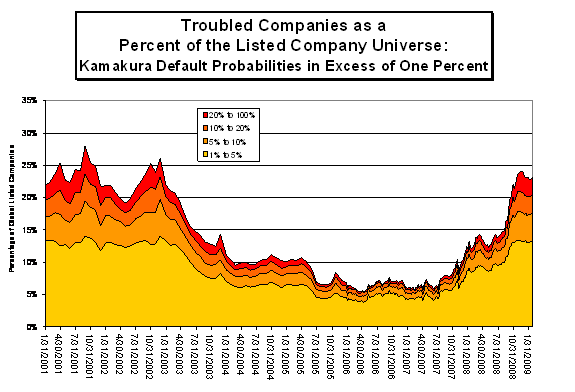Location: New York
Author: Warren Sherman
Date: Monday, March 2, 2009
Kamakura Corporation announced Monday that the Kamakura index of troubled public companies for February changed only slightly from January. The Kamakura global index of troubled companies increased modestly by 0.1% to 23.2% of the public company universe, still 0.8% below the recent peak of 24.0% reported for December 2008.
Kamakura defines a troubled company as a company whose short term default probability is in excess of 1%. The all-time high in the index was 28.0%, recorded in September 2001. The index shows that credit conditions are essentially unchanged from January. Credit conditions remain better than only 6.2% of the monthly periods since the start of the index in January, 1990. The all-time low in the index was 5.4%, recorded in April and May, 2006.
The index covers more than 21,000 public companies in 30 countries using the fourth generation version of Kamakura's advanced credit models. Kamakura noted that it continues to expand the breadth of its global credit index, with 350 public firms in Australia and more than 1000 public firms in Korea recently added to the Kamakura Risk Information Services default probability data base.
Kamakura also provided an update on troubled firms underlying its index. "On February 3, Kamakura reported that Royal Bank of Scotland was among the rated companies with the largest one month jumps in short term default risk,” said Warren Sherman, Kamakura President and Chief Operating Officer. "On February 26, the bank agreed to a deal which could raise the U.K. government’s ownership to 95 percent. This month, among rated public companies, the companies showing the sharpest rise in short term default risk were Chemtura Corporation, Arvinmeritor Inc., Belo Corporation, Alcatel-Lucent, and Office Depot Inc. In February, the percentage of the global corporate universe with default probabilities between 1% and 5% increased by 0.2% to 13.3%. The percentage of companies with default probabilities between 5% and 10% was up 0.1% to 4.3% of the universe in February. The percentage of the universe with default probabilities between 10 and 20% was down for the second month in a row, dropping 0.2% to 2.8% of the universe. The percentage of companies with default probabilities over 20% was down 0.1% to 2.7% of the total universe in February, compared with a peak of 3.3% in December."


To subscribe or visit go to: http://www.riskcenter.com